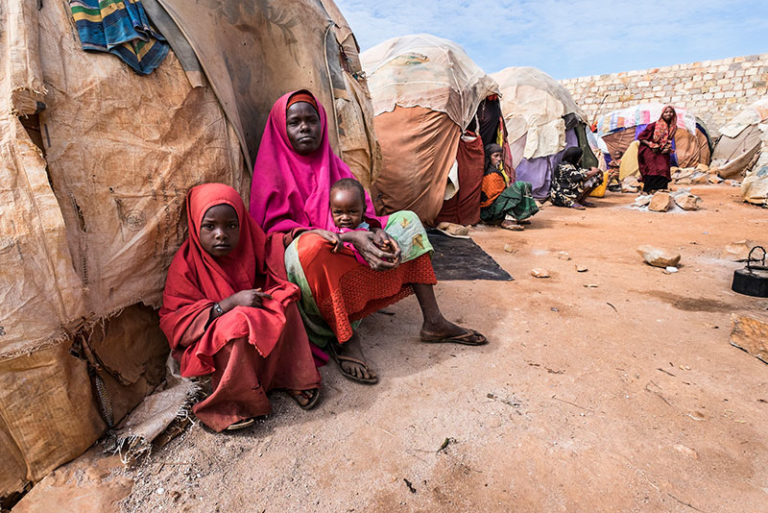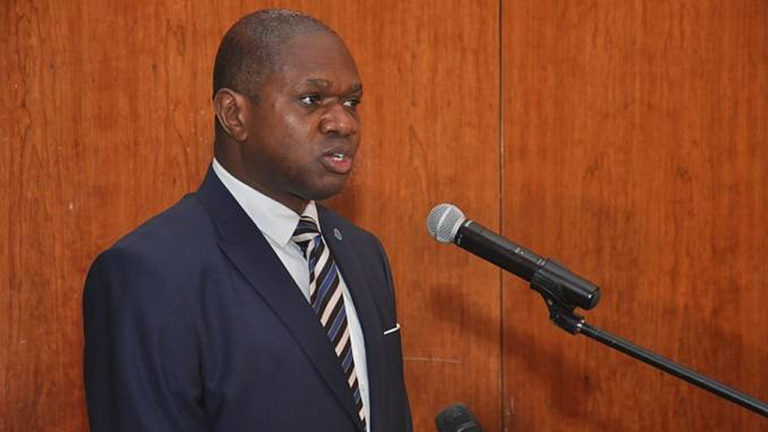Severe drought, conflict displaced 32,000 in Somalia in October – UN
About 32,000 people have been displaced by conflict and severe drought ravaging several parts of Somalia in October, the UN humanitarian agency said on Thursday, November 30, 2017.

The UN Office for Coordination of Humanitarian Affairs (OCHA) said in its latest bulletin that this is a slight decline in the number of newly displaced people, compared to about 49,000 people displaced in September.
“Of those displaced in October, 23,000 were due to drought related reasons as the cause of the displacement, while 8,000 cited conflict,’’ the UN said.
The Horn of Africa nation is in the midst of unprecedented drought after rains failed for the fourth year in a row.
Humanitarians in Somalia have mobilised $1.2 billion since January for famine prevention to reach the most vulnerable with life-saving assistance.
The UN agency, which cited figures compiled by the UNHCR-led Protection and Return Monitoring Network (PRMN), said over one million people have been displaced due to drought compounded by armed conflict since January, mainly from rural areas to urban centres.
It said the latest displacements bring the estimated number of displaced in Somalia to over two million people.
“It is imperative to complement humanitarian assistance with more sustainable durable solutions for IDPs, currently making up over 16 per cent of the population,’’ OCHA said.
Dry season farming: FAO to support 110,000 households in North-East
At least 110,000 households, comprising 700,000 people in Adamawa, Borno and Yobe states, are to benefit from the Food and Agriculture Organisation (FAO) input support for the 2017/2018 dry season farming.
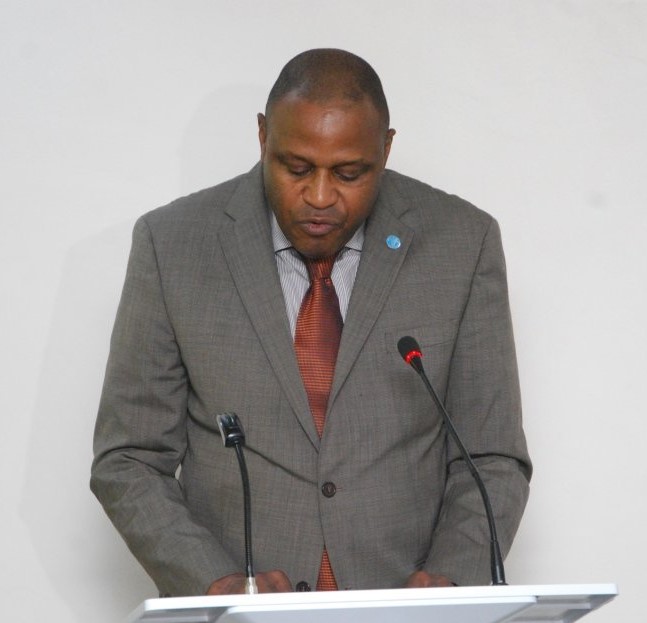
The FAO Country Representative, Mr Suffyan Koroma, made this known on Thursday, November 30, 2017 in Yola, Adamawa State at the inauguration of FAO dry season input support programme.
Koroma said the beneficiaries comprised the Internally Displaced Persons (IDPs) in formal and informal camps, returnees and host communities.
Koroma also said 44,575 households in 15 local government areas would benefit from the support in Adamawa alone.
“These 15 Local Government Areas (LGAs) have been identified by the Adamawa authorities as having high potential for irrigated vegetables and rice production.
“The inputs to be provided will include kits of vegetable seeds, rice seeds, fertiliser, water pumps and hand tools kits for micro gardening.
“Extension services will be provided by Adamawa State Agriculture Development Programme distributed in 15 LGAs.
“Furthermore, farmers Field Schools will be introduced in the LGAs to promote best agricultural and nutrition practices,” Koroma said.
He recalled that, during last cropping season, 41,000 households were reached with improved seeds of staple food.
The food he said include millet, maize, cowpea and sorghum while women headed households got additional support of vegetable kits and fertiliser.
According to Koroma, FAO assessment shows that the interventions has considerably boosted the households’ food security and nutrition status in the state.
The FAO country representative said that FAO was also supporting a livestock restocking programme in Adamawa State.
“Under this programme, 250 bulls will be distributed to youths for fattening and generating activities, while 6,350 goats will be distributed, mainly to women to rebuild their assets and foster nutrition.”
Koroma reiterated the commitment of FAO to ensuring the implementation of its mandate of a ”World free from hunger.”
He lauded donors of the programme: Belgium, France, Germany, Ireland, Norway, US-OFDA, SIDA, Switzerland, Central Emergency and Relief Fund of UN.
In his remarks, Gov. Muhammadu Bindow of Adamawa State lauded FAO for its sustained support to food security in the state
He was represented by the Commissioner for Agriculture, Mr Waziri Ahmadu.
The governor said the state government was making effort to modernise agriculture and needed the technical and resource support of FAO to succeed.
Also in his remarks, the representative of American University of Nigeria (AUN), the implementing partner of the programme in Adamawa, Prof. Yusuf Attahiru, commended the programme.
He said the institution, as part of its efforts to support the transformation of agriculture, would introduce agriculture business management programme.
Attahiru expressed optimism that the planned programme, when materialised, would support the transformation of agriculture to business and make it more attractive.
Responding on behalf of beneficiaries, Mr Moses Kafare and Mrs Philomena Dagoje, who are IDPs, said that the interventions by FAO had affected their lives positively.
“We can now feed ourselves. This approach is like the popular proverb of teaching somebody how to fish which is better than continue giving him fish.
”We are indeed grateful for the support,” Kafare said.
By Yakubu Uba
UNIDO urges government to implement policy on solid waste management
The United Nations Industrial Development Organisation (UNIDO) on Thursday, November 30, 2017 urged the Federal Government to implement the National Policy on Solid Waste Management in the country.
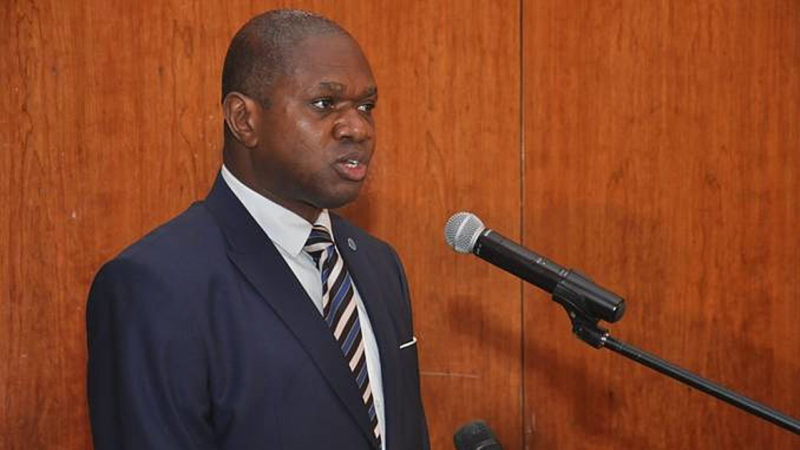
The UNIDO Country Representative, Mr Jean Bakole, made the appeal in Abuja at the National Stakeholders’ Workshop on the Review and Validation of Draft National Policy on Solid Waste Management in Nigeria.
Bakole, who was represented by UNIDO National Programme Officer, Dr Chuma Ezedimma, said that Nigeria, as a leader in Africa, must demonstrate its leadership through the effective implementation of the policy.
According to him, solid waste is a global problem which needs an effective and economical management strategy.
He said that countries were facing increasing challenges of solid waste management, adding that with an increasing global population, solid waste generation was bound to be on the increase.
“According to a United Nations Environment Programme (UNEP) report, bulk density of residential waste in some countries was taken and compared, and Nigeria recorded 250kg, as against 330kg for Egypt.
“The U.S. recorded 100kg, as against 150kg for UK; 400kg to 600kg for India and 400kg for Indonesia,’’ he said.
Bakole said that the review and validation of the draft policy on national solid waste management was, therefore, essential because it would help to guide relevant stakeholders on specific areas of investments in solid waste management.
“This draft will also identify the key stakeholders and build an effective institutional structure, while facilitating incentives, job creation and linkages to global environment treaties.
“To ensure the success of this policy, there must be political will and private sector involvement; efforts should be made to encourage research and development, aggressive awareness drive, realistic action and effective enforcement drive,’’ he said.
The Minister of State for Environment, Alhaji Ibrahim Jibril, who declared the workshop open, urged the participants to contribute meaningfully to the policy document, which was aimed at ensuring sustainable solid waste management in the country.
Jibril, who was represented by the Permanent Secretary, Federal Ministry of Environment, Alhaji Shehu Ahmed, expressed delight at the number of the workshop participants who were drawn from different waste management organisations.
He urged the participants to produce a critical document that would safeguard the environment and human health against unwholesome disposal and handling of solid waste.
Also speaking, Prof. Oladele Osibanjo, the National President, Waste Management Society of Nigeria, urged the Federal Government to provide an enabling environment that would facilitate private sector-driven management of waste resources.
He said that the government must spearhead efforts to develop and enforce the national policy on solid waste management so as to spur investments in waste management and recycling projects.
By Deji Abdulwahab
WE-Africa condemns slavery in Libya
Members of Wellbeing Economy Africa Network (WE-Africa) rose from their meeting held in Pretoria, South Africa, November 27 to 29, 2017 with a strong call to put an end to modern day enslavement of migrants and refugees in Libya and for the prosecution of those complicit in the dehumanising acts for crimes against humanity.
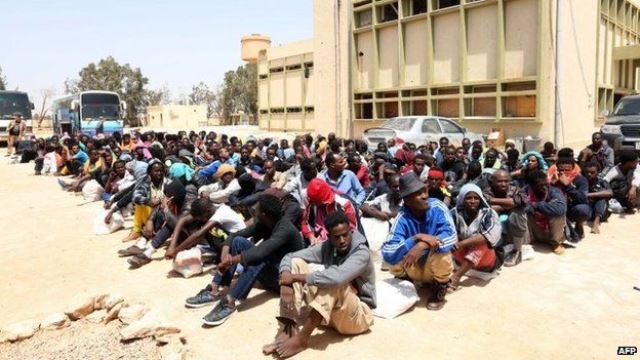
WE-Africa is an action-research alliance of likeminded scholars and practitioners who share a common concern about the current socio-economic conditions in which we live and are willing to work together to promote a transition to a wellbeing-based economy for Africa. WE-Africa works to consolidate evidence for change while focusing on building a new economy and promoting alternative development policies.
WE-Africa recognises that the abominable events in Libya are a culmination of a number of factors, none of which, however, excuses the inhuman acts. Such factors include the fact that most African nations are riddled with conflicts and dependent on wasteful economic policies that do not meet the basic needs of their citizens. Some of these refugees were thus seeking an escape from poverty, war, unemployment and environmental destruction. They had already endured the hazards of passing through the hostile Sahara Desert before being held in Libya, with Europe turning a blind eye to such gross human rights violations. Their journeys into slavery began as migrants as well as economic, political and climate refugees hoping to make their ways to the Mediterranean coasts of Libya and crossing over to Europe.
WE-Africa says it recognises that facilitating the downfall of regimes through external military intervention without creating the necessary conditions for a democratic transition has created a fertile condition for serious humanitarian disasters and human rights abuses. An example, it adds, is the military intervention in Libya by NATO, which has contributed to the present situation, adding to centuries of colonialism and decades of neo-colonialism that have led to ecological mayhem and rising inequality in Africa.
Against the backdrop of the Euro-Africa summit taking place in Abidjan (Cote d’Ivoire), WE-Africa calls on the European Union to recall its complicity in what is happening in Libya and not to forget their long-standing relations with Africa, including historical, ecological and climate debts, and ease access to their territory as this would eliminate the power of illicit cartels trading in human misery.
WE-Africa regrets that, at a time when economies of African nations are said to be “growing”, the social and economic realities of citizens remain abysmal.
In a declration, WE-Africa called on the African Union and African governments to:
- Request the United Nations Human Rights Commission to conduct a detailed investigation and bring those who are accountable for this terrible and inhuman act to justice.
- Go beyond demanding for a probe of the subhuman treatment being meted to Africans by other Africans on our continent and take an immediate diplomatic and political actions to stop these inhuman acts.
- To carry out investigations on why their citizens prefer to embark on the hazardous journey to Libya rather than remain in their home countries.
- Urgently put in place pro-people measures that ensures full employment, security, access to health, education and other social needs.
- Urgently recognise and utilise the rich human resources and gifts of Nature in the continent to derive alternatives pathways to wellbeing, including increased human development indices.
- Question the use of indices such as Gross Domestic Product (GDP) that give false notions of growth while citizens groan under the weight of unjust and inequitable economic relations.
- Embrace a difference approach to development inspired by the concept of “Wellbeing Economy” to build the pathway to an egalitarian future and entrenched in the spirit of Ubuntu.
“We cannot be silent. African governments cannot be silent. Time to act is now!” declared the group.
Turkish Airlines pledges to curb illegal wildlife trade
Turkish Airlines has signed the “United for Wildlife Buckingham Palace Declaration (UFW)”, pledging for zero-tolerance regarding the illegal wildlife trade.
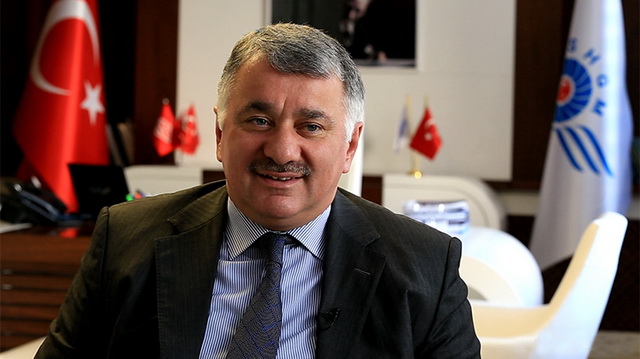
Indeed, the UFW, which was on the agenda of the 73rd International Air Transport Association (IATA) Annual General Meeting held in Cancun, Mexico last June, has been endorsed by 41 airline companies so far.
The declaration, also signed by institutions such as Airports Council International (ACI), African Airlines Association (AFRAA), Airlines Association of Southern Africa (AASA) and London Heathrow Airport, is aiming to stop the illegal wildlife trade of tusk, rhino horn, and tortoise shell etc. as well as increasing passenger, customer, client, and staff awareness about the nature, scale, and consequences of the illegal wildlife trade.
The declaration was approved recently by Turkish Airlines at a signing ceremony held at the Turkish Airlines Istanbul Headquarters, attended by Bilal Ekşi, Turkish Airlines Deputy Chairman and CEO, and IATA Director General, Alexandre de Juniac.
“With this declaration, we as Turkish Airlines are not only underlining one of the most important environmental issues of our times, trafficking of wildlife, but we are also setting an example of responsibility. Today with this signature we hope that we are contributing to the level of awareness on the issue and smoothing the path for legal enforcement procedures against the traffickers,” said Mr. Ekşi during the signing ceremony.
Mr. de Juniac said: “The illegal wildlife trade threatens to extinguish many of the world’s most iconic and special creatures. The global connectivity built by the aviation industry is being exploited by traffickers, but through coordinated action with our industry partners, and assisting the proper authorities, we can help to end this dreadful trade. We welcome Turkish Airlines’ commitment to join this fight, symbolized in its signature to the Buckingham Palace declaration.”
Airlines’ commitments expression and demonstration of agreement to tackle the illegal wildlife trade are listed as follows:
- Adopt or encourage the adoption of a zero-tolerance policy regarding illegal wildlife trade.
- Increase passenger, customer, client, and staff awareness about the nature, scale, and consequences of illegal wildlife trade.
- Promote the Declaration and its Commitments across the entire transport sector and encourage all in the sector to sign up to the Declaration.
- Develop mechanisms to enable the transport sector to receive timely information about the transport of suspected illegal wildlife and their products, including methods of transportation, key routes, ports and other locations.
- Enhance data systems, including due diligence and risk assessment, to allow the transport sector and/or enforcement agencies to screen data and/or cargo, to identify potential shipments of suspected illegal wildlife and their products.
- Identify and promote systems for staff and the public to report suspicions in relation to the transportation of illegal wildlife and their products.
- Improve the training of staff within the transport sector to enable them to detect, identify and report suspected illegal wildlife trade, and acknowledge staff who champion this cause.
- Develop a secure, harmonised system for passing information about suspected illegal wildlife trade from the transport sector to relevant customs and law enforcement authorities, where permitted by law.
- Notify relevant law enforcement authorities of cargoes suspected of containing illegal wildlife and their products and, where able, refuse to accept or ship such cargoes.
- Establish a cross-disciplinary team working with local customs and law enforcement authorities to develop a system of best practice for combatting illegal wildlife trade in key ports.
- Support the development of mechanisms by the World Customs Organisation and national customs authorities to aid the detection and prevention of trade in illegal wildlife and their products.
World AIDS Day: Group wants government commitment to health of Nigerians
A non-governmental organisation (NGO), APIN Public Health Initiative, has called on government at all levels to invest in the health of Nigerians by showing commitment to ownership and sustainability of HIV and AIDS response.

Dr Prosper Okonkwo, the Chief Executive Officer of the NGO, said this on Wednesday, November 29, 2017 in Abuja, while briefing newsmen as part of activities to commemorate the 2017 World AIDS Day with the theme: “Right to Health, Making it Happen’’.
According to him, the World AIDS Day is an opportunity to highlight the success of worldwide efforts to combat HIV and AIDS as well as the importance of continued support to end AIDS in 2030.
Okonkwo quoted Dr Sani Aliyu, Director-General, National Agency for the Control of AIDS (NACA), who said that “it was important to bring all state governments to national response by ensuring that all states have budget lines for HIV and AIDS in 2018.’’
The News Agency of Nigeria (NAN) reports that the NACA boss made the statement while delivering a paper entitled “Nigerian Government’s commitment to ownership and sustainability was important’’ recently.
Okonkwo said funding of HIV and AIDS was not the responsibility of the Federal Government alone, adding that health in Nigeria was on the concurrent list in the constitution, and every tier of government had a role to play.
He said APIN Public Health Initiative was determined to use its position as the U.S. Centre for Disease Control to lead implementation partners in eight states to engage state institutions and relevant stakeholders.
According to him, the partnership will drive programme sustainability, impact and achievement of each state 90:90:90 targets as well as the global agenda to end AIDS by 2030.
The 90; 90; 90 outlined targets must be achieved to end the chapter of AIDS epidemic globally by 2030.
It means by “2020, 90 per cent of all people living with HIV will know their status.
“By 2020, 90 per cent of all people with diagnosed HIV infection will receive sustained anti-retro viral therapy.
“By 2020, 90 per cent of all people receiving anti-retro viral therapy will have viral suppression.’’
Okonkwo said in the past five years, APIN carried out HIV testing for about four million individuals in the country with 70,655 persons enrolled on free HIV and AIDS treatment in three states of Lagos, Oyo and Plateau state.
He further announced additional five states under APIN coverage of the new Improved Comprehensive AIDS Response Enhanced for Sustainability (ICARES) Project, which he said was a great leap toward the 90 per cent UNAIDS goal.
The states are Ogun, Ondo, Osun, Ekiti, and Benue, making APIN the lead implementation partner in Nigeria.
In commemoration of the day, Okonkwo called on Nigerians, especially men, to go for HIV and AIDS test, to enable everyone know their status.
The chief executive officer of the NGO added that the general public could go for testing during weekends or at evenings in the designated HIV testing facilities.
This, he said was a new innovation deployed by APIN and were evidenced based strategies to ensuring that people at substantial risk of HIV had access to HIV testing.
NAN reports that APIN Public Health Initiative is an NGO dedicated to the prevention, treatment, care and support of diseases of public health concern in Nigeria, including HIV and AIDS, tuberculosis and malaria.
By Talatu Maiwada
Bayelsa community members shut down Shell oil wells
Some members of a community in Bayelsa on Wednesday, November 29, 2017 disrupted oil production at Adibawa Oil field operated by Shell Petroleum Development Company (SPDC), shutting two oil wells.

A reliable source, who pleaded anonymity, told the News Agency of Nigeria (NAN) that the protesters were from Tanbiri II, Biseni in Yenagoa who were demanding power supply from the nearby oil facility.
NAN gathered that two oil wells, Adibawa well 4 and Adibawa well 10 feeding the Adibawa flow station, were shut down by the protesters.
NAN correspondent, who visited the oil fields, reports that hundreds of residents comprising youths, women and elders blocked access road to the shut oil wells, singing solidarity songs amidst songs from local musical instruments.
Mr Oyeso Atena, the Youth President of Biseni Community, said that they were aggrieved over the inability of SPDC to link the community to a power plant located at Adibawa flow station in spite of several meetings.
“We took the step as a last resort following several talks; the oil firm had given us hope, but they later backed out by telling us that the transmission line to our community is not strong enough and cannot carry the power.
“We have several oil wells here and merely shutting two of them has put the entire Adibawa flow station out of action and that shows that without the oil wells from here, the flow station cannot fire and we are just asking that they should give us electricity from that facility.
“We are not asking for too much for a company that has operated here since 1972 and there is no history of hostage taking, no attack on oil workers and no incident of vandalism of facilities.
“Our expectation is that they reciprocate our peaceful dispositions and not take our peaceful nature for weakness, we have vowed to remain here until they respond to us” the youth leader said.
When contacted Spokesman for the Joint Task Force deployed to protect oil facilities in the Niger Delta region said that he had no information on the incident, saying he would verify the claim and respond.
Also efforts to reach Mr Joseph Obari, an SPDC spokesman, were futile as he could not be reached on his mobile phone.
By Nathan Nwakamma
Global malaria control progress stalls, says report
After unprecedented global success in malaria control progress has stalled, according to the World Malaria Report 2017. There were an estimated five million more malaria cases in 2016 than in 2015. Malaria deaths stood at around 445,000, a similar number to the previous year.
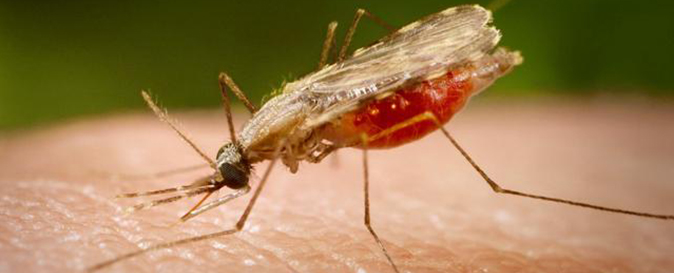
“In recent years, we have made major gains in the fight against malaria,” said Dr Tedros Adhanom Ghebreyesus, Director-General of WHO. “We are now at a turning point. Without urgent action, we risk going backwards, and missing the global malaria targets for 2020 and beyond.”
The WHO Global Technical Strategy for Malaria calls for reductions of at least 40% in malaria case incidence and mortality rates by the year 2020. According to WHO’s latest malaria report, the world is not on track to reach these critical milestones.
A major problem is insufficient funding at both domestic and international levels, resulting in major gaps in coverage of insecticide-treated nets, medicines, and other life-saving tools.
Funding shortage
An estimated $2.7 billion was invested in malaria control and elimination efforts globally in 2016. That is well below the $6.5 billion annual investment required by 2020 to meet the 2030 targets of the WHO global malaria strategy.
In 2016, governments of endemic countries provided $800 million, representing 31% of total funding. The United States of America was the largest international funder of malaria control programmes in 2016, providing $1 billion (38% of all malaria funding), followed by other major donors, including the United Kingdom of Great Britain and Northern Ireland, France, Germany and Japan.
The global figures
The report shows that, in 2016, there were an estimated 216 million cases of malaria in 91 countries, up from 211 million cases in 2015. The estimated global tally of malaria deaths reached 445,000 in 2016 compared to 446,000 the previous year.
While the rate of new cases of malaria had fallen overall, since 2014 the trend has levelled off and even reversed in some regions. Malaria mortality rates followed a similar pattern.
The African Region continues to bear an estimated 90% of all malaria cases and deaths worldwide. Fifteen countries – all but one in sub-Saharan Africa – carry 80% of the global malaria burden.
“Clearly, if we are to get the global malaria response back on track, supporting the most heavily affected countries in the African Region must be the primary focus,” said Dr Tedros.
Controlling malaria
In most malaria-affected countries, sleeping under an insecticide-treated bednet (ITN) is the most common and most effective way to prevent infection. In 2016, an estimated 54% of people at risk of malaria in sub-Saharan Africa slept under an ITN compared to 30% in 2010. However, the rate of increase in ITN coverage has slowed since 2014, the report finds.
Spraying the inside walls of homes with insecticides is another effective way to prevent malaria. The report reveals a steep drop in the number of people protected from malaria by this method – from an estimated 180 million in 2010 to 100 million in 2016 – with the largest reductions seen in the African Region.
The African Region has seen a major increase in diagnostic testing in the public health sector: from 36% of suspected cases in 2010 to 87% in 2016. A majority of patients (70%) who sought treatment for malaria in the public health sector received artemisinin-based combination therapies (ACTs) – the most effective antimalarial medicines.
However, in many areas, access to the public health system remains low. National-level surveys in the African Region show that only about one third (34%) of children with a fever are taken to a medical provider in the public health sector.
Tackling malaria in complex settings
The report also outlines additional challenges in the global malaria response, including the risks posed by conflict and crises in malaria endemic zones. WHO is currently supporting malaria responses in Nigeria, South Sudan, Venezuela (Bolivarian Republic of) and Yemen, where ongoing humanitarian crises pose serious health risks. In Nigeria’s Borno State, for example, WHO supported the launch of a mass antimalarial drug administration campaign this year that reached an estimated 1.2 million children aged under five years in targeted areas. Early results point to a reduction in malaria cases and deaths in this state.
A wake-up call
“We are at a crossroads in the response to malaria,” said Dr Pedro Alonso, Director of the Global Malaria Programme, commenting on the findings of this year’s report. “We hope this report serves as a wake-up call for the global health community. Meeting the global malaria targets will only be possible through greater investment and expanded coverage of core tools that prevent, diagnose and treat malaria. Robust financing for the research and development of new tools is equally critical.”
US state, local governments warned to brace for climate shocks
Global credit rating agency, Moody’s Investor Services, has released a new report describing the importance of measures to reduce greenhouse gas emissions and build resilience to the inevitable impacts of climate change in order to avoid negative credit ratings. The findings are relevant for states and municipalities in the United States.

The US is still recovering from the devastating impacts of severe hurricanes such as Irma, Maria and Harvey that caused a widespread destruction of lives and livelihoods, and damaged properties and infrastructure of billions of dollars.
The report “Environmental Risks – Evaluating the impact of climate change on US state and local issuers,” forecasts that the accelerating impacts of climate change, including increasing global temperatures and rising sea levels, will make an impact on the financial health of US states and municipalities in the years ahead. Moody’s assigns credit ratings to bond issuers to indicate the risk of default.
“While we anticipate states and municipalities will adopt mitigation strategies for extreme climate events, costs to employ them could also become an ongoing credit challenge. Our analysis of economic strength and diversity, access to liquidity and levers to raise additional revenues are also key to our assessment of climate risks as is evaluating asset management and governance,” Michael Wertz, Moody’s Vice President, said.
The frequency and intensity of extreme weather events – natural disasters, floods, heatwaves and droughts – is likely to increase with the rise in global average temperature. Recognising the importance of mitigation (reducing greenhouse gases) and adaptation (building resilience) strategies to avoid the worst impacts of climate change, the Paris Agreement aims to limit the average global temperature rise well below two degrees Celsius and as close as possible to 1.5 degrees.
Differentiating between climate shocks and long-term climate shifts
The Moody’s report makes a distinction between climate trends – long term shifts in the climate over several decades – and climate shocks, defined as extreme weather events exacerbated by climate trends.
Extreme weather events make significant impacts on an issuer’s infrastructure, economy and revenue base, and environment. The report explains how the credit agency factors these impacts into its analysis of an issuer’s economy, fiscal position and capital infrastructure, as well as management’s ability to marshal resources and implement strategies to drive recovery.
One example of climate shock driving rating change was when Hurricane Katrina stuck the city of New Orleans (rating: A3 Stable). In addition to widespread infrastructure damage, the city’s revenue declined significantly and a large percentage of its population permanently left New Orleans.
For issuers, the availability of state and federal resources is a key element that improves the response capabilities of local governments and their ability of mitigate credit impacts. Moody’s analysis weighs the impact of climate risks with states and municipalities’ preparedness and planning for these changes while analyzing credit ratings.
Analysts for municipal issuers with higher exposure to climate risks will also focus on current and future mitigation steps and how these steps will impact the issuer’s overall profile when assigning ratings.


